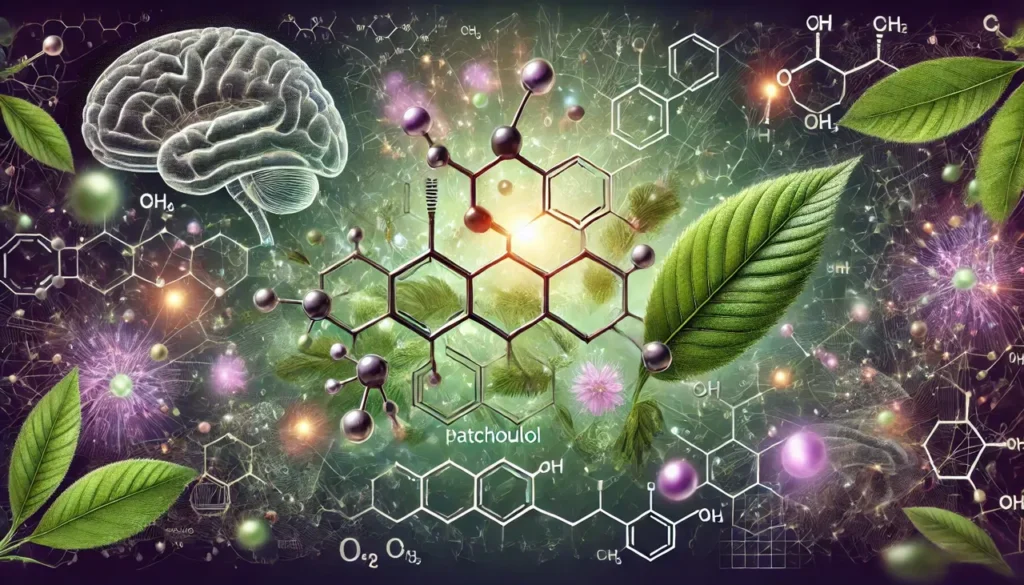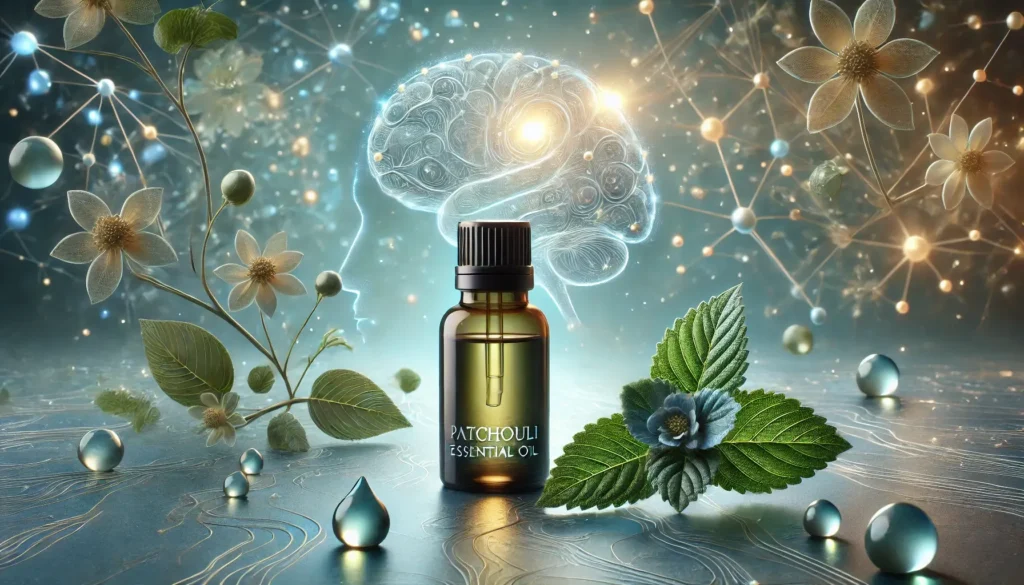Patchouly oil, extracted from the leaves of Pogostemon cablin, is an aromatic essential oil native to tropical regions of Asia, particularly India, Indonesia, and the Philippines. Widely recognized for its musky, earthy scent, patchouly oil has been used for centuries in perfumes, incense, and traditional medicine. Beyond its olfactory appeal, recent studies suggest that patchouly oil may have nootropic properties, offering potential cognitive benefits due to its active components, which include sesquiterpenes, patchoulol, and α-bulnesene.
This article provides an in-depth exploration of patchouly oil’s nootropic potential, its chemistry, physiological mechanisms of action in the body and brain, appropriate dosage guidelines, possible side effects, and interactions with other supplements and medications.
You May Also Like:
Sunflower Oil: Benefits, Dosage, Side Effects, Drug Interactions, and Other Important Information
Source of Patchouly Oil
Patchouly oil is derived from the leaves of the patchouli plant (Pogostemon cablin), a member of the mint family. The plant is cultivated in tropical regions for its essential oil, which is obtained through steam distillation of dried leaves. The oil is prized for its use in perfumes and traditional herbal remedies and is increasingly being studied for its potential health benefits, particularly its effects on mood and cognition.
- Distillation process: High-quality patchouly oil is produced by steam distillation of mature patchouli leaves. The oil’s potency and chemical composition can vary depending on the age of the plant and the length of the distillation process.
- Commercial availability: Patchouly oil is widely available as pure essential oil or diluted in carrier oils, and can also be found in various personal care products, such as soaps and lotions.
In addition to its use as a topical or aromatic compound, patchouly oil is now being explored for its nootropic potential, particularly in stress reduction and cognitive enhancement.
Promote Healthy Skin and Support Cognitive Function with Premium Patchouli Oil—Shop Today on Amazon!

Chemistry of Patchouly Oil
Patchouly oil contains several bioactive compounds, many of which contribute to its potential nootropic effects. The most significant constituents include:
- Patchoulol (or patchouli alcohol): A sesquiterpene responsible for much of the oil’s scent and medicinal properties, patchoulol is thought to exert neuroprotective effects by reducing oxidative stress and inflammation in the brain.
- α-Bulnesene: Another sesquiterpene, α-bulnesene has anti-inflammatory properties, which may help protect neurons from damage and support cognitive function by reducing inflammation.
- Caryophyllene: A naturally occurring compound also found in black pepper and clove, caryophyllene has both anti-inflammatory and anxiolytic properties, which may help improve mood and cognitive performance.
- Pogostone: A compound unique to patchouly oil, pogostone exhibits antimicrobial and antioxidant effects, offering protection to brain cells against oxidative damage.
These active components interact with the brain’s neurotransmitter systems and provide antioxidant and anti-inflammatory benefits, making patchouly oil a candidate for cognitive enhancement.

Physiological Mechanisms of Patchouly Oil in the Body and Brain
Patchouly oil’s potential nootropic effects are thought to be related to its influence on mood regulation, stress response, and neuroprotection. Its physiological mechanisms of action include:
- Antioxidant Activity: The brain is particularly susceptible to oxidative damage due to its high oxygen consumption. Patchouly oil contains potent antioxidants, such as patchoulol and pogostone, which scavenge free radicals and protect neurons from oxidative stress. By reducing oxidative damage, patchouly oil may help prevent cognitive decline and neurodegenerative conditions such as Alzheimer’s disease.
- Anti-inflammatory Effects: Inflammation in the brain, particularly neuroinflammation, is a contributing factor to cognitive decline and neurological disorders. Patchouly oil’s sesquiterpenes, such as α-bulnesene and caryophyllene, have been shown to reduce inflammation by inhibiting pro-inflammatory cytokines. This reduction in inflammation may improve cognitive function and slow the progression of neurodegenerative diseases.
- Mood Regulation through GABA Modulation: Patchouly oil has been linked to the modulation of GABA (gamma-aminobutyric acid), the brain’s primary inhibitory neurotransmitter. By enhancing GABA activity, patchouly oil promotes relaxation and reduces anxiety, which can have a direct impact on cognitive performance. Improved GABA function is associated with better mood regulation, reduced stress, and enhanced focus and mental clarity.
- Anxiolytic and Stress-Reduction Effects: Through the action of compounds like caryophyllene, patchouly oil may reduce anxiety and lower cortisol levels, the body’s primary stress hormone. Chronic stress impairs cognitive function, particularly memory and learning, and reducing stress can help maintain cognitive performance. This makes patchouly oil potentially beneficial in situations that require mental resilience and focus.
- Neuroprotective Properties: Patchouly oil’s ability to reduce oxidative stress and inflammation also contributes to its neuroprotective effects. The oil may help preserve cognitive function and support long-term brain health by protecting neurons from damage.
Unlock Soft, Healthy Skin and Boost Mental Clarity with Patchouli Oil—Order Today on Amazon!

Nootropic Benefits of Patchouly Oil
The use of patchouly oil as a nootropic is still under investigation, but its chemical composition suggests several potential cognitive benefits, particularly in the areas of mood regulation, stress reduction, and neuroprotection.
- Enhanced Mental Clarity and Focus: Patchouly oil’s ability to modulate GABA and reduce anxiety can lead to improved mental clarity and focus. By promoting relaxation and reducing mental distractions, the oil may help individuals stay more focused and perform better on cognitive tasks.
- Stress Management and Cognitive Performance: Chronic stress impairs cognitive function, particularly in memory, attention, and problem-solving. Patchouly oil’s anxiolytic properties, mediated through its interaction with GABA and cortisol, may help reduce stress and improve cognitive resilience in stressful situations.
- Mood Enhancement: The interaction between patchouly oil’s sesquiterpenes and neurotransmitter systems can have a positive effect on mood. By promoting relaxation and reducing anxiety, patchouly oil may improve emotional well-being and contribute to better cognitive performance, particularly in individuals suffering from anxiety or stress-related cognitive impairments.
- Neuroprotection and Prevention of Cognitive Decline: Patchouly oil’s antioxidant and anti-inflammatory properties make it a candidate for neuroprotection. Regular use may help protect against oxidative stress and neuroinflammation, both of which contribute to age-related cognitive decline and neurodegenerative diseases.
- Memory Support: Although direct evidence is limited, patchouly oil’s neuroprotective effects may support memory retention and learning by protecting brain cells from damage and promoting better synaptic function.

Dosage and Supplementation Guidelines
Discover Skin-Soothing and Brain-Boosting Benefits with Patchouli Oil—Buy Now on Amazon!

While patchouly oil is primarily used in aromatherapy and topically, it can also be taken internally in small doses, though caution is advised due to its potency. Dosage recommendations for cognitive enhancement are less well-established than for its use in aromatherapy or skincare, but some general guidelines can be followed:
- Aromatherapy Dosage: Patchouly oil can be diffused in an essential oil diffuser for nootropic purposes. Adding 5-10 drops of patchouly oil to a diffuser can help promote relaxation, reduce anxiety, and improve focus. Inhaling the oil’s scent is the most common method for using it as a cognitive enhancer.
- Topical Use: When applying patchouly oil topically, it should be diluted with a carrier oil such as coconut or jojoba oil to avoid skin irritation. A typical dilution is 1-2 drops of patchouly oil per teaspoon of carrier oil. Topical application to pulse points, such as the temples or wrists, may help reduce stress and enhance cognitive performance.
- Internal Use: While less common, patchouly oil can be taken internally in very small amounts. If consuming it, it is crucial to use only high-quality, food-grade patchouly oil. A typical dose would be one drop diluted in a carrier oil or mixed into a beverage. However, internal use should be done under the guidance of a healthcare provider, as patchouly oil is potent and can cause adverse effects if used improperly.
Side Effects and Safety
Patchouly oil is generally considered safe when used in moderation, but there are potential side effects and safety concerns, particularly when it is taken internally or used in high concentrations.
- Skin Irritation: Undiluted patchouly oil can cause skin irritation in some individuals, particularly those with sensitive skin. It is important to dilute the oil in a carrier oil before applying it topically.
- Digestive Distress: When taken internally in large amounts, patchouly oil may cause digestive upset, including nausea and stomach pain. Internal use should be limited to very small doses and should only be done under professional supervision.
- Allergic Reactions: Some individuals may experience allergic reactions to patchouly oil, such as skin rashes, itching, or difficulty breathing. Individuals with known allergies to essential oils or plants in the mint family should avoid using patchouly oil.
- Sedation: Patchouly oil may cause drowsiness due to its sedative properties, particularly when used in high doses. This makes it unsuitable for use before activities that require alertness, such as driving.
Interactions with Other Supplements and Medications
Patchouly oil may interact with certain medications and supplements, particularly those affecting the central nervous system or those with sedative properties.
- Sedatives and CNS Depressants: Patchouly oil’s relaxing and sedative effects may be enhanced when used in combination with other CNS depressants, such as benzodiazepines, barbiturates, or alcohol. This can increase the risk of excessive sedation and respiratory depression.
- Antidepressants and Anti-anxiety Medications: Patchouly oil’s effects on mood regulation may interact with antidepressants or anti-anxiety medications. Individuals taking SSRIs, SNRIs, or MAO inhibitors should use caution when combining patchouly oil with these medications, as the effects may be additive.
- Blood Pressure Medications: Patchouly oil may lower blood pressure, and when combined with antihypertensive drugs, it could cause a further drop in blood pressure, leading to dizziness or fainting.
Risks for Individuals with Certain Health Conditions
Patchouly oil should be used with caution by individuals with certain health conditions, particularly those with respiratory issues, low blood pressure, or liver disease.
- Pregnancy and Breastfeeding: There is limited research on the safety of patchouly oil during pregnancy and breastfeeding. It is recommended that pregnant or breastfeeding women avoid using patchouly oil unless advised by a healthcare provider.
- Respiratory Conditions: Individuals with asthma or other respiratory conditions should use patchouly oil with caution, as strong essential oils can sometimes trigger respiratory symptoms.
- Low Blood Pressure: Individuals with hypotension or those taking medications to lower blood pressure should monitor their blood pressure closely when using patchouly oil, as it may cause a further drop in blood pressure.
Rejuvenate Your Skin and Enhance Mental Wellness with Patchouli Oil—Order Today on Amazon!

Conclusion: Should You Consider Patchouly Oil as a Nootropic?
Patchouly oil’s unique combination of antioxidant, anti-inflammatory, and anxiolytic properties makes it a compelling candidate for cognitive enhancement. Its ability to modulate GABA, reduce oxidative stress, and protect neurons suggests that it may help improve mental clarity, focus, and mood while providing neuroprotection. However, its use as a nootropic is still in the early stages of research, and more studies are needed to confirm its efficacy.
As with any supplement, it is important to use patchouly oil responsibly, particularly when considering internal use or combining it with other medications. Consulting with a healthcare provider is essential, especially for individuals with pre-existing health conditions or those taking other supplements or medications.
Patchouly oil offers potential nootropic benefits, particularly in stress management, mood regulation, and neuroprotection. Its versatility as both an aromatic and topical agent makes it a valuable addition to a cognitive wellness regimen. However, it should be used with caution and proper guidance to avoid adverse effects.

References:
- Patchouli Oil Benefits and Uses. Retrieved from: https://www.healthline.com/health/patchouli-oil
- Patchouli Oil – Uses, Side Effects, and More. Retrieved from: https://www.webmd.com/vitamins/ai/ingredientmono-213/patchouli-oil
- Help Reduce Depression & Inflammation with Patchouli Oil. Retrieved from: https://draxe.com/essential-oils/patchouli-oil/
- Patchouli Essential Oil and Its Derived Compounds Revealed Prebiotic-Like Effects in C57BL/6J Mice. Retrieved from: https://pmc.ncbi.nlm.nih.gov/articles/PMC6812344/
Important Note: The information contained in this article is for general informational purposes only, and should not be construed as health or medical advice, nor is it intended to diagnose, prevent, treat, or cure any disease or health condition. Before embarking on any diet, fitness regimen, or program of nutritional supplementation, it is advisable to consult your healthcare professional in order to determine its safety and probable efficacy in terms of your individual state of health.
Regarding Nutritional Supplements Or Other Non-Prescription Health Products: If any nutritional supplements or other non-prescription health products are mentioned in the foregoing article, any claims or statements made about them have not been evaluated by the U.S. Food and Drug Administration, and such nutritional supplements or other health products are not intended to diagnose, treat, cure, or prevent any disease.


